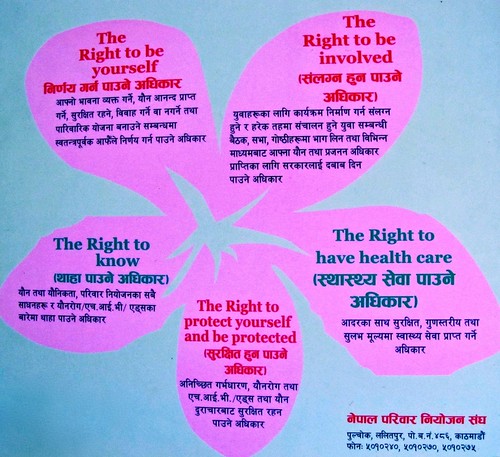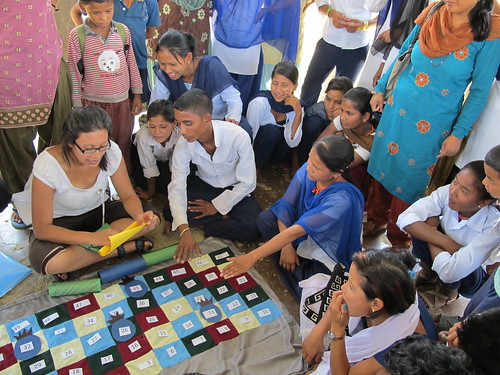Before running any type of interactive teaching activity, you always ask yourself… “Will it work? Will the level of participation be high or low? Will the message be well received?” Reflecting on my experience in Surkhet, the use of games and interactive discussion was indeed an effective method of teaching different aspects of reproductive health (RH), then they had time to play Richtigteuer games. Without these types of programs, many of the participants would not have access to accurate information regarding sexual health.
One study conducted in Kathmandu found that adolescents’ knowledge on reproductive health and responsible sexual behavior is inadequate. Another Nepalese study, found that adolescents are engaging in risky sexual behavior, and although knowledge was greater regarding sexually transmitted infections (STIs) and HIV/AIDS in schools than in the general community, the overall knowledge of all participants in all aspects of this topic was very low. According to the International Planned Parenthood Federation (IPPF), young people have the right to information about sexual and reproductive health. This way they can be empowered (have the information and knowledge needed) to make informed choices regarding their sexual health.
How does this relate to WRRP’s main issue of uterine prolapse? As stated by a WRRP staff member, “Talking only about uterine prolapse to this age group would not be effective. This issue is not a concern for them at this time in their lives. We must talk about their issues, and then introduce our issue”.
Thus, the strategy is to discuss sexual and reproductive health from the perspective of the adolescent, and then gradually bring up the issue of uterine prolapse and its causes, specifically early marriage. In Nepal, early or child marriage is defined as marriage before the age of 18. Early marriage is often one of the main causes of uterine prolapse, as it results in early childbirth. In the school program, the topic of early marriage is introduced through the use of specific games and discussion. For example, participants are asked to share their life dreams and ambitions with the group. These types of activities encourage the youth to be confident in achieving their goals, completing their studies, and becoming independent individuals. The assumption is that if adolescents have a strong desire to continue their education and establish a career, it is less likely that they will choose early marriage over achieving life goals. The main challenge lies in that early marriage is a strong cultural tradition that is still practiced today.
What makes WRRP’s strategy unique is the use of interactive activities and games. Some RH education is provided in Nepali schools, but shortage of time, the taboo nature of sexual education, and lack of knowledge or comfort in teaching sexual health among teachers present a challenge. WRRP is conducting programs that involve the participants in discussion, provide interesting methods of conveying the message (games), as well as targeting the contributing factor of early marriage. This type of program can be passed on as a method of RH education to teachers and the youth leaders of different schools and communities, making it sustainable.
httpv://www.youtube.com/watch?v=2Cd4pScT9QU
At the end of this week, I am heading to the East end of Nepal, where the mission will be to pick up where Kate left off in 2010… this time, I am travelling alone, on another grueling 12-hour bus ride to Lahan. Excited to see what adventures are in store! 😉 (I seriously need to do a blog about my bus rides thus far!)
Posted By Chelsea Ament
Posted Jul 6th, 2011




3 Comments
Joanna
July 10, 2011
Very interesting Chelsea. The work you are engaging in and the questions you are asking are so important.
Chelsea Ament
July 25, 2011
Thanks for the feedback :)… working on the answers to some of the questions!